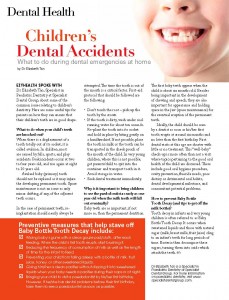 This article first appeared in the February 2013 issue of Ezyhealth magazine. We have reproduced it for the information of those of you who missed it when it was published.
This article first appeared in the February 2013 issue of Ezyhealth magazine. We have reproduced it for the information of those of you who missed it when it was published.
Ezyhealth spoke with Dr Elizabeth Tan, Specialist in Paediatric Dentistry at Specialist Dental Group, about some of the common issues relating to children’s dentistry. Here are some useful tips for parents on how they can ensure that their children’s teeth are in good shape.
What to do when your child’s teeth are knocked out?
When there is a displacement of a tooth totally out of its socket, it is called avulsion. In children, most are caused by falls, sports, and play accidents. Peak incidents occur at two to four years old, and rise again at eight to 10 years old.
Avulsed baby (primary) teeth should not be replaced as it may injure the developing permanent tooth. Space maintenance is not an issue as only minor drifting, if any, of the adjacent teeth occurs.
In the case of permanent teeth, re-implantation should nearly always be attempted. The time the tooth is out of the mouth is a critical factor. First-aid protocol that should be followed are the following:
- Don’t touch the root – pick up the tooth by the crown
- If the tooth is dirty, wash under cool running water for about ten seconds. Re-plant the tooth into its socket and hold in place by biting gently on a handkerchief. If not possible, place the tooth in milk or the tooth can be transported in the cheek pouch of the mouth of the child. In very young children, where this is not possible, get parents/child to spit into the container and transport tooth in it. Avoid storage in water
- Seek dental treatment immediately
Why is it important to bring children to see the paedodontist as early as one year old when the milk teeth will fall out eventually?
Baby teeth are as important, if not more so, than the permanent dentition. The first baby teeth appear when the child is about six months old. Besides being important in the development of chewing and speech, they are also important for appearance and holding space in the jaw (space maintenance) for the eventual eruption of the permanent teeth.
Ideally, the child should be seen by a dentist as soon as his/her first tooth erupts at around six months and no later than the first birthday. First dental visits at this age are shorter with little or no treatment. This “well-baby” check-up is more often than not a visit where topics pertaining to the good oral health of the child are discussed. These include good oral hygiene procedure, cavity prevention, fluoride needs, poor dietary or detrimental oral habits, dental developmental milestone, and concomitant potential problems.
How to prevent Baby Bottle Tooth Decay (and tips to get off the milk bottle)?
Tooth decay in infants and very young children is often referred to as Baby Bottle Tooth Decay. It occurs when sweetened liquds and those with natural sugar (milk, breast milk, fruit juice) cling to an infant’s teeth for long periods of time. Bacteria then decompose these sugars, turning them into acids which attack the teeth.
Preventive measures that help stave off Baby Bottle Tooth Decay include:
- Wiping baby’s gums with a clean gauze pad/cloth, after each feeding. When the child’s first tooth erupts, start brushing it
- Reducing the frequency of consumption of milk as well as the length of time for the infant to feed
- Preventing your child from falling asleep with a bottle of milk, fruit juice, honey, or other sweetened liquids
- Giving him/her a clean pacifier without dipping it into sweetened liquids when your baby needs a pacifier during their naps or at night
- Bringing your child to visit a paedodontist by his/her first birthday. However, if he/she has dental problems before their first birthday, take them to see a paedodontist as soon as possible





